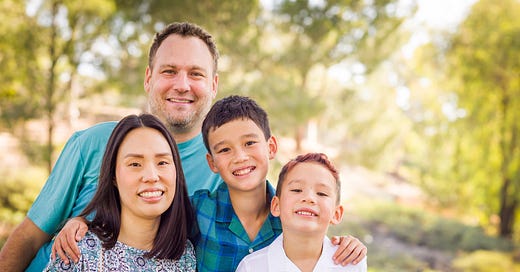Study suggests early disclosure doesn't harm family dynamics
Psychological Adjustment in Disclosing and Non-disclosing Heterosexual-couple Families (Widbom, 2022)
Widbom, A., Sydsjö, G., & Lampic, C. (2022). Psychological adjustment in disclosing and non-disclosing heterosexual-couple families following conception with oocytes or spermatozoa from identity-release donors. Reproductive BioMedicine Online, 45(5), 1046-1053. https://doi.org/10.1016/j.rbmo.2022.06.011
Geographic Region: Sweden
Research Question: Is there a relationship between disclosure and psychological adjustment in heterosexual-couple families following oocyte donation and sperm donation when the child is 7 years old?
Design: This study is part of the fourth wave of data collection for Swedish Study on Gamete Donation, prospective longitudinal study. Questionnaires distributed via mail. Measures included the Hospital Anxiety and Depression Scale (HADS), ENRICH marital inventory, Swedish Parenthood Stress Questionnaire (SPSQ), and Strengths and Difficulties Questionnaire (SDQ-Swe). Factorial analysis of variance (ANOVA).
Sample: 196 parents representing 110 couples total. For oocyte donation families, 83 parents responded out of all possible participants (56%). For sperm donation families, 113 parents responded out of possible participants (65%). The families were studied when the children were 7-8 years old.
Key Findings
About half of parents had disclosed donor conception to their child (61% of oocyte donation 61%, 58% of sperm donation).
No significant differences found between disclosing and non-disclosing families in parents' psychological well-being, relationship quality, parental stress, or children's psychological adjustment.
Majority of participants showed normal range scores for anxiety and depression.
Children showed good psychological adjustment with low levels of emotional and behavioral problems.
Limitations: Study-specific measurement of disclosure status may not capture nuances in disclosure process ("Yes, I have started talking about it" was the only response that qualified as disclosure). Possible influence of repeated surveys on parents' awareness of disclosure issues. Self-reported data. Cross-sectional design limits causal conclusions.
Applications: Suggests early disclosure does not negatively impact family functioning
Funding Source: Not explicitly stated in the provided excerpt
Lead Author: Andreas Widbom is a clinical psychologist working within reproductive medicine, specializing in psychosocial aspects of treatments with donated sperm and oocytes.
Regulatory Context
Sweden was one of the first countries to implement identity-release donation, passing legislation in 1984 that went into effect in 1985.
Only altruistic gamete donation is allowed. Donors can receive compensation for expenses and inconvenience, but not payment for the gametes themselves.
Both sperm and egg donation are permitted. Embryo donation became legal in 2019.
Same-sex female couples have had access to donor insemination since 2005 and IVF since 2016. Single women gained access in 2016.
Donation is only allowed at authorized fertility clinics. Private arrangements are not legal.
All prospective donors and recipients must undergo counseling and medical/psychological screening.
Donors must be 18 years or older.
Anonymous donation is prohibited. All donors must agree to be identifiable to offspring.
Donor-conceived individuals have the legal right to obtain identifying information about their donor when they reach "sufficient maturity," typically interpreted as age 18, though no specific age is mandated by law.
Parents are encouraged, but not legally required, to tell children about their donor conception. However, the information is recorded in medical records that the child can access as an adult.
There are restrictions on how many children/families can be created from one donor's gametes, but the exact number can vary between clinics.
A central register of all donor treatments is maintained by the National Board of Health and Welfare.
Donors do not have any legal or financial obligations to offspring. They are not considered the legal parents.



